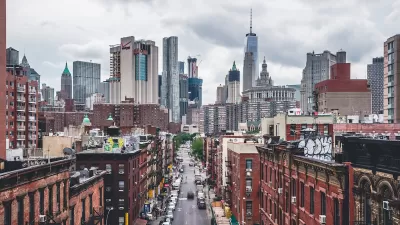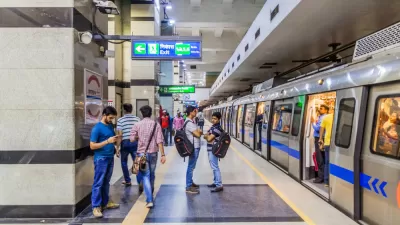As more and more people move to the cities, the prevalence of economic and racial segregation becomes more and more apparent.
"Increasingly cosmopolitan metropolises on every continent live under the specter of global tensions flaring up on their streets rather than on some distant battlefield. Even though this climate of fear hasn't stopped the inexorable path of urbanization, it has made growth patterns more segregated. Modern urban cityscapes better reflect Orval Faubus's vision for the world than Martin Luther King's. When Lyndon Johnson declared segregation 'forbidden' in the halcyon sixties, I doubt he or anyone else envisioned the racial and economic fault lines that divide cities four decades later. Segregation as a legal institution vanished in most places, but it's alive and well as a market phenomenon."
"A recent article by Peer Smets and Ton Salman in Urban Studies argues that 'segregation is indeed on the rise, its effects are becoming gloomier and there is ample reason for concern.' Urban development, once the domain of the state, is increasingly left to the private sector where market forces dictate catering to the upper classes. This leaves large segments of society sequestered in shabbier districts with less access to public or private services. Shrinking and out-of-fashion welfare states are unable to address the growing gap between rich and poor in most cities. Nor are they a match for the needs of the oncoming migration waves into cities worldwide."
FULL STORY: One World, Segregated

Planetizen Federal Action Tracker
A weekly monitor of how Trump’s orders and actions are impacting planners and planning in America.

Maui's Vacation Rental Debate Turns Ugly
Verbal attacks, misinformation campaigns and fistfights plague a high-stakes debate to convert thousands of vacation rentals into long-term housing.

Restaurant Patios Were a Pandemic Win — Why Were They so Hard to Keep?
Social distancing requirements and changes in travel patterns prompted cities to pilot new uses for street and sidewalk space. Then it got complicated.

In California Battle of Housing vs. Environment, Housing Just Won
A new state law significantly limits the power of CEQA, an environmental review law that served as a powerful tool for blocking new development.

Boulder Eliminates Parking Minimums Citywide
Officials estimate the cost of building a single underground parking space at up to $100,000.

Orange County, Florida Adopts Largest US “Sprawl Repair” Code
The ‘Orange Code’ seeks to rectify decades of sprawl-inducing, car-oriented development.
Urban Design for Planners 1: Software Tools
This six-course series explores essential urban design concepts using open source software and equips planners with the tools they need to participate fully in the urban design process.
Planning for Universal Design
Learn the tools for implementing Universal Design in planning regulations.
Heyer Gruel & Associates PA
JM Goldson LLC
Custer County Colorado
City of Camden Redevelopment Agency
City of Astoria
Transportation Research & Education Center (TREC) at Portland State University
Jefferson Parish Government
Camden Redevelopment Agency
City of Claremont





























